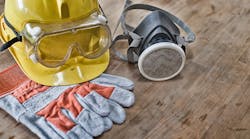Very few electricians would attempt to squeeze the last nickel out of a tool purchase they made years ago. Most electricians would never consider using a screwdriver with a chipped blade or an old ratchet that slips. They would replace these tools rather than risk doing shoddy work because of them.
Do most electricians have this same attitude toward PPE? Do you?
Consider:
- Foam ear plugs are so cheap, you buy them by the box (or your company does). If you use these, take a look at the ones you have. Are they discolored, due to being rolled up dozens of times? Do they compress fully and expand fully, or are they worn out?
- Sure, you can cast your glance a little to the side of that big scratch in your safety glasses. Or if the lenses of your glasses have dozens of tiny abrasions, do you just squint to see through them? If safety glasses hinder visibility in any way, replace them.
Many companies that provide glasses have a one-a-year plan or something similar. But if your glasses aren’t serviceable, that doesn’t mean you can’t spend $4 to replace them yourself rather than wait for your “free” pair. Why not buy a box of them for use at work and at home?
- You’ve been carrying around that same K95 respirator for days now. You have to use it periodically because of silica work others do in your work area sometimes. These respirators are made of fiber, which gets gunked up by sticking particles because you exhale moisture into them. They are not meant to be re-used.
If you observe those drywall installers on the floor below you, you’ll probably see they start each shift with a new mask. At morning break, lunch, and afternoon break, they replace their masks. Trying to breathe through a respirator that has turned gray with drywall dust (or any dust) is a losing game.
- Did you know your footwear is considered PPE? For it to work properly, you need to rest it for a day after using it for a day. So, you need a minimum of two pairs of work shoes/boots so you can alternate them. If you wear the same pair each day, they lose nearly all of their cushioning effect; this leads to back problems, neck problems, and general fatigue.
To keep this footwear from becoming a breeding ground for bacteria and mold, spray white vinegar into them before setting them aside to “rest” for a day. If you do not have a spray bottle of vinegar, you can solve this by picking up a gallon of white vinegar and a plastic spray bottle from the grocery store. It’s a great disinfectant and cleaner.
- Work gloves protect your hands, but no single pair can do that indefinitely. Check yours for holes, abrasions, ground-in grime, and other signs that it’s time to replace them.
Sponsored Recommendations
Sponsored Recommendations




